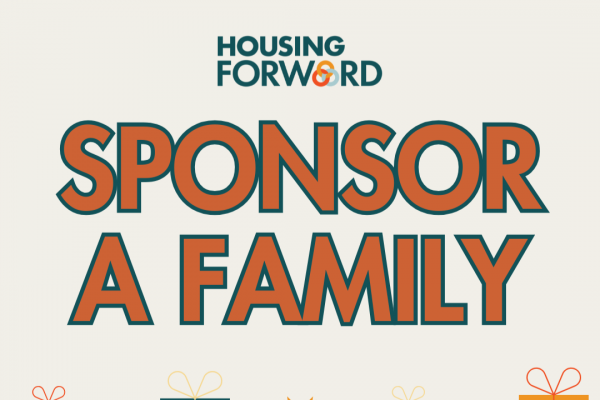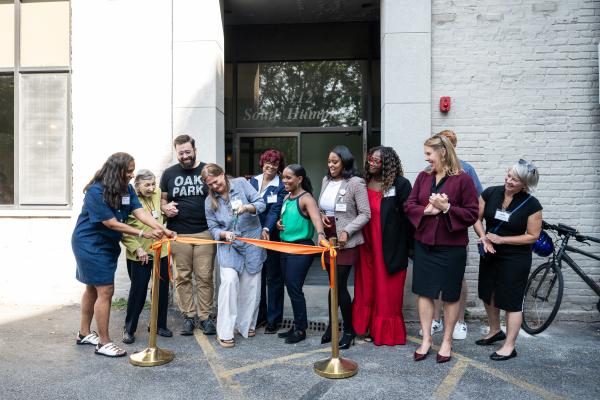2025 PIT Count
On January 29th, broadcast journalist Kristin Gourlay joined the Housing Forward team for the annual PIT Count. This annual count is a nationwide effort to track the number of people experiencing homelessness on a given night. This data is used to inform the budgets of organizations like Housing Forward and by Congress to decide the amount of funding that will go towards federal agencies like HUD. The following is a transcript of the audio report from Gourlay.
---------------
KRISTIN GOURLAY: To fix a problem, you have to know the size of it. And when it comes to homelessness, that means counting the number of people who are unhoused to get the best possible estimate and that, an actual count, happens once a year. Housing Forward CEO Lynda Schueler explains the point in time, or PIT count.
LYNDA SCHUELER: All across the nation, there are groups of volunteers that go out and count the unhoused, as well as the number of people that are in shelters on a given night.
GOURLAY: Municipalities report their numbers to the Housing and Urban Development Agency, or HUD, and HUD presents the data to Congress with recommendations for how much money to allocate for addressing homelessness. Ultimately, Congress decides.
An army of volunteers helps with the PIT count. Recently, a bunch of them gathered at Housing Forwards headquarters in Maywood to get their PIT count assignments. They received packets with maps, forms for counting, flyers with resources for unhoused people, and these bright reflective vests so people could see them coming. Teams prepped to fan out to western suburban communities like Franklin Park and Oak Park. They would visit shelters, parking lots, police stations, public libraries, anywhere people who are unhoused might be spending the night.
Volunteer Craig Osmond joined a team headed for Franklin Park, and he brought a valuable perspective. He was unhoused for nine years. He understands the toll that can take.
CRAIG OSMOND: Your mental outlook is sometimes really, really bad. It’s depression, it's a lot of things, maybe some anger.
GOURLAY: Housing Forward CEO Lynda Schueler worries that Osmond and his team may encounter even more people going through that ordeal this year. The number of unhoused people has been going up for a while. In 2024, it spiked 13% over the previous year in the suburbs, more than 200% in Chicago alone. One big driver is a lack of affordable housing. Schueler says another huge reason, the cost of the housing we already have.
SCHUELER: It's really about the increase in rents that have gone up, you know, several hundred dollars a month for households that are already living paycheck to paycheck. And so that increase in rent at the annual renewal can really hit somebody in the pocketbook.
GOURLAY: Schueler says the impact of those rising rents and even the increase in homelessness may not be as visible in the suburbs, which Housing Forward serves, but people are suffering.
SCHUELER: People tend to, you know, not necessarily sleep under viaducts in the suburbs. They're finding themselves maybe staying at a 24/7 McDonald's or sleeping in their car in the Walmart parking lot. They're not necessarily, you know, putting tents out in visible spaces.
GOURLAY: Schueler says suburban homelessness is more diverse than it is in the city in.
SCHUELER: In terms of the working poor, single family households, medically vulnerable. Certainly, there are those folks that suffer from mental illness and addiction, that's part of the population. But we're actually seeing numbers shift now that we're seeing a lot more individuals who are on that immediate edge of homelessness, or they're in our shelter and they are, in fact, working. About 50% [of clients in Housing Forward’s shelter] are working. They just don't have the sufficient income to sustain monthly bills like rent, vehicle insurance, copays, utilities and what have you.
GOURLAY: People experiencing homelessness may need a range of services, Schueler says, but the first answer is to get them housing. And she's worried a new presidential administration may not honor the value of that approach.
SCHUELER: We get people housing, then we wrap them with all those necessary supportive services, and it's not contingent on sobriety or medication management. But we, I think, will conceivably see a shift in that philosophy that really concerns us, because what it will do is it will mean that more people will be lingering in shelter until they go through some mandated treatment. That is not how we want to operate our services, because we know, inherently, that housing is foundational, and you can't address higher needs until you have some level of stability in your life to be able to address those higher needs.
GOURLAY: Craig Osmond, the formerly homeless volunteer who helped with the PIT Count, remembers what it was like when he finally came home, when he could finally address those higher needs thanks to Housing Forward.
OSMOND: There wasn't a toothpick in that place. I laid in a corner. My coat was my pillow. I didn't have a pillow or a blanket. I was finally at peace. I was finally at peace. I didn't even care if anything was in that apartment. It was silent. [pauses] I'll never forget it. I know exactly where I slept that night. I look at that corner and I go, “that's the first night I was here.” There was nothing in this apartment but my clothes, couple clothes, and my coat that I used for a pillow. I was richest man on earth. Felt like it.
GOURLAY: Osmond now lives in Oak Park.
GOURLAY: PIT Count tally should be ready in the spring of 2025. Until then, Housing Forward will continue its mission to prevent homelessness, respond to the needs of people who are unhoused, and help them stabilize once they're in housing. They do that, not only with the funds from the federal government, but also generous donations of money and volunteer time.
For more of Gourlay's work, visit https://www.kristingourlay.com/
For Media Inquiries Contact
Libby Foster
lfoster@housingforward.org
708.338.1724 ext 210


